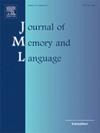Semantic fluency is associated with reduced temporal discounting
IF 3
1区 心理学
Q1 LINGUISTICS
引用次数: 0
Abstract
People vary in their temporal discounting, the tendency to prefer smaller, sooner rewards over larger, later rewards. Higher temporal discounting (i.e., more impatience) is associated with detrimental behaviors, such as substance abuse and physical inactivity. Therefore, understanding the cognitive capacities underlying individual differences in temporal discounting is important. Previous research has suggested that episodic memory supports future-oriented decision making by facilitating prospection, but an association between episodic memory abilities and temporal discounting has not yet been established in a cognitively normal population. One potential reason for this lack of an association is that semantic memory, not episodic memory, underlies reduced temporal discounting. After all, semantic memory provides the conceptual “scaffolding” for imagining the future. Here we tested the hypothesis that semantic memory is negatively associated with temporal discounting in an online study of 203 adults. We assessed semantic memory function in two ways: a semantic fluency task and a Deese-Roediger-McDermott (DRM) false memory recognition task. The semantic fluency task measures voluntary semantic memory retrieval, while the false memory paradigm assesses the extent to which semantic information biases episodic retrieval. We found that better semantic fluency was associated with reduced temporal discounting, even after controlling for letter fluency, age, gender, education, and socioeconomic status. However, false memory rate was not a significant predictor of temporal discounting. These findings provide novel evidence that semantic memory retrieval abilities may support future-oriented decisions.
语义流畅性与时间折扣减少有关
人们对时间的贴现是不同的,人们倾向于更小、更快的奖励,而不是更大、更晚的奖励。较高的时间折扣(即,更多的不耐烦)与有害行为有关,如滥用药物和缺乏身体活动。因此,了解时间折扣中个体差异背后的认知能力是很重要的。先前的研究表明,情景记忆通过促进前瞻来支持面向未来的决策,但是情景记忆能力和时间折扣之间的联系尚未在认知正常人群中建立。缺乏这种联系的一个潜在原因是语义记忆,而不是情景记忆,是时间折扣减少的基础。毕竟,语义记忆为想象未来提供了概念性的“脚手架”。本文通过对203名成年人的在线研究,验证了语义记忆与时间折扣负相关的假设。我们通过两种方式评估语义记忆功能:语义流畅性任务和迪斯-罗迪格-麦克德莫特(DRM)错误记忆识别任务。语义流畅性任务测量自愿语义记忆检索,而错误记忆范式评估语义信息对情景检索的偏差程度。我们发现更好的语义流畅性与减少时间折扣相关,即使在控制了字母流畅性、年龄、性别、教育程度和社会经济地位之后也是如此。然而,错误记忆率并不是时间折现的显著预测因子。这些发现为语义记忆检索能力可能支持面向未来的决策提供了新的证据。
本文章由计算机程序翻译,如有差异,请以英文原文为准。
求助全文
约1分钟内获得全文
求助全文
来源期刊
CiteScore
8.70
自引率
14.00%
发文量
49
审稿时长
12.7 weeks
期刊介绍:
Articles in the Journal of Memory and Language contribute to the formulation of scientific issues and theories in the areas of memory, language comprehension and production, and cognitive processes. Special emphasis is given to research articles that provide new theoretical insights based on a carefully laid empirical foundation. The journal generally favors articles that provide multiple experiments. In addition, significant theoretical papers without new experimental findings may be published.
The Journal of Memory and Language is a valuable tool for cognitive scientists, including psychologists, linguists, and others interested in memory and learning, language, reading, and speech.
Research Areas include:
• Topics that illuminate aspects of memory or language processing
• Linguistics
• Neuropsychology.

 求助内容:
求助内容: 应助结果提醒方式:
应助结果提醒方式:


